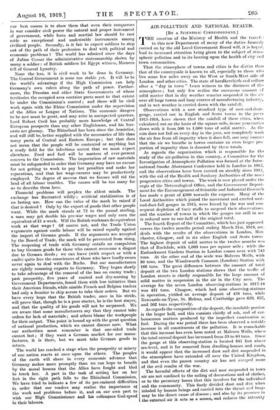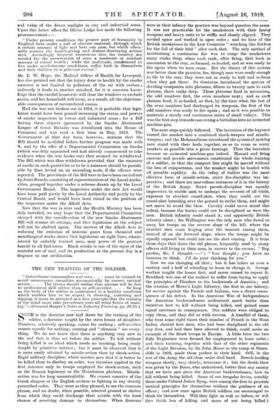AIR-POLLUTION AND NATIONAL HEALTH.
[By A SCIENTIFIC CORRESPONDENT.]
THE creation of the Ministry of Health and the trana ft: to this new Department of many of the duties formerly
carried on by the old Local Government Board will, it is hored, lead to increased attention being given to the subject of atmo- spheric pollution and to its bearing upon the health of city and town communities.
That the atmosphere of towns and cities is far dirtier than that of the countryside is known to all, especially to those who live some few miles away on the West or South-West side of London and other cities. Tho state of handkerchiefs and collars after a " day in town " bears witness to the dirtiness of the atmosphere ; but only few realize the enormous amount of solid matter that in dry weather remains suspended in the air over all large towns and busy centres of manufacturing industry, and in wet weather is carried down with the rainfall.
Observations with a new standard type of soot-and-dust- gauge, carried out in English and Scots towns in the years 1915-1918, have shown that the rainfall of these cities, whoa calculated out on the basis of the square mile, in one year carries
down with it from 500 to 1,000 tons of solid matter. As the rain does not fall on every day in the year, nor completely wash the air free from all impurity when it does fall, one may assume that the air we breathe in towns contains an even larger pro• portion of impurity than is denoted by these totals.
As regards the organization which is responsible for the study of the air-pollution in this country, a Committee for the Investigation of Atmospheric Pollution was formed at the Inter- national Smoke Abatement Conference held in London in 1912, and the observations have been carried on steadily since 1914, with tho aid of the Health and Sanitary Authorities of the Mora progressive cities and towns. The work is now placed under the aegis of the Meteorological Office, and the Government Depart- ment for the Encouragement of Scientific and Industrial Research has made a grant of £500 towards the expense. Many of the Local Authorities which joined the movement and erected soot- and-dust-fall gauges in 1915, were forced by the war and con- sequent depletion of their staffs to suspend their observations, and the number of towns in which the gauges are still in use is reduced now to one-half of the original total.
The fourth Report of the Committee, which has just appeared covers the twelve months period ending March 31st, 1918, ant. deals with the results of the observations in London, Man chester, Glasgow, and in six other English and Scots town. The highest deposit of solid matter in the twelve months was that of Rochdale, with 1,069 tons per square mile ; while the Embankment Gardens Station in London comes next with 743 tons. At the other end of the scale was Malvern Wells, with 80 tons, and the Wandsworth Common (London) Station with 166 tons. The great difference between the amount of total deposit at the two London stations shows that the traffic of London streets is chiefly responsible for the large amount of solid matter in suspension in the air in the City area. The average for the seven London observing-stations in 1917-18 was 431 tons. Glasgow, which had nine observing-stations in operation, yielded an average deposit of 438 tons, while Newcastle-on-Tyne, St. Helens, and Coatbridge gave 639, 637, and 502 tons respectively.
As regards the composition of the deposit, the insoluble portion is the larger half, and this consists chiefly of ash, and of car• bonaceous matters produced by the imperfect combustion fuel. During the war period there has been observed a notably increase in all constituents of the pollution. It is remarkable that this increase has even been noted at Malvern Wells, where the total annual deposit has increased from 59 to 80 tons. Since the gauge at this observing-station is located 681 feet above sea-level, and is far removed from dwelling-houses and roads, it would appear that the increased dust and dirt suspended in the atmosphere have extended all over the United Kingdom, and that even the purest country air has not escaped some of the evil results of the war.
The harmful effects of the dirt and soot suspended in town air are not confined to the soiling of decorations and of clothes, or to the pecuniary losses that this involves for the individual and the community. This finely divided dust and dirt when inhaled by human beings and carried into the throat and lungs may be the direct cause of disease ; and also by its presence in the external air it acts as a screen, and reduces the intensity and value of the direct sunlight in city and industrial areas. Upon this latter effect Sir Oliver Lodge has made the following pronouncement:
" Under present conditions the greater part of humanity in England lives under a pall of obscure material, through which a certain amount of light and heat can pass, but which effect- ually screens the health-giving and disease-destroying actinic rays. Accordingly frequent excursions into the country are needed for the preservation of even a moderate or residual amount of robust health ; while the multitude, condemned to live under unwholesome conditions, suffer both in themselves and their children to a grievous extent."
Dr. E. W. Hope, the Medical Officer of Health for Liverpool, has also pointed out that the injury done to health by the smoke nuisance is not limited to pollution of the air with carbon ; indirectly it leads to another mischief, for it is common know- ledge that the careful housewife will close the windows to exclude
smuts, and her household will incur, as a result, all the objection- able consequences of unventilated rooms.
Had the war not broken out in 1914, it is probable that legis- lation would have been passed increasing the status and powers of smoke inspectors in towns and industrial areas ; for a Bill having these objects (promoted by the Smoke Abatement League of Great Britain) was introduced into the House of Commons and was read a first time in May, 1913. The Government of that day were, however, anxious that the Bill should be modified before further progress was made with it, and by the offer of a Departmental Commission on Smoke (which was duly appointed and had already commenced to take evidence when the war broke out) they secured its withdrawal. The Bill which was thus withdrawn provided that the emission of smoke in such quantities as to be a nuisance should be punish- able by fines levied on an ascending scale, if the offence were repeated. The provisions of the Bill were to have been carried out by Joint Boards, consisting of representatives of the Local Autho- rities, grouped together under a scheme drawn up by the Local Government Board. The inspectors under the new Act would have been paid partly by the Local Authority and partly by the Central Board, and would have been raised to the position of the inspectors under the Alkali Acts.
Now that the war is over and the Health Ministry has been duly installed, we may hope that the Departmental Committee charged with the consideration of the new Smoke Abatement Bill will resume its sittings, and that legislation on the subject will not be shelved again. The success of the Alkali Acts in reducing the emission of noxious gases from chemical and metallurgical works shows that legislation on right lines, admin- istered by suitably trained men, may prove of the greatest benefit to all fuel-users. Black smoke is one of the signs of the wasteful use of coal, and its production at the present day is a disgrace to our civilization.



































 Previous page
Previous page